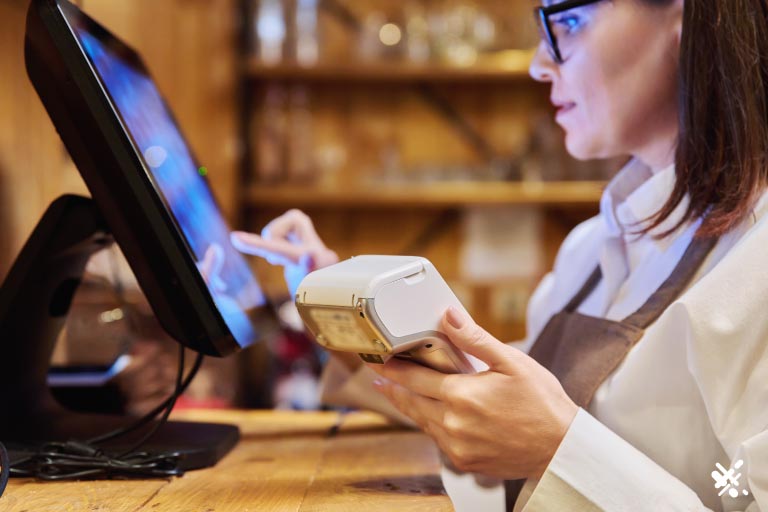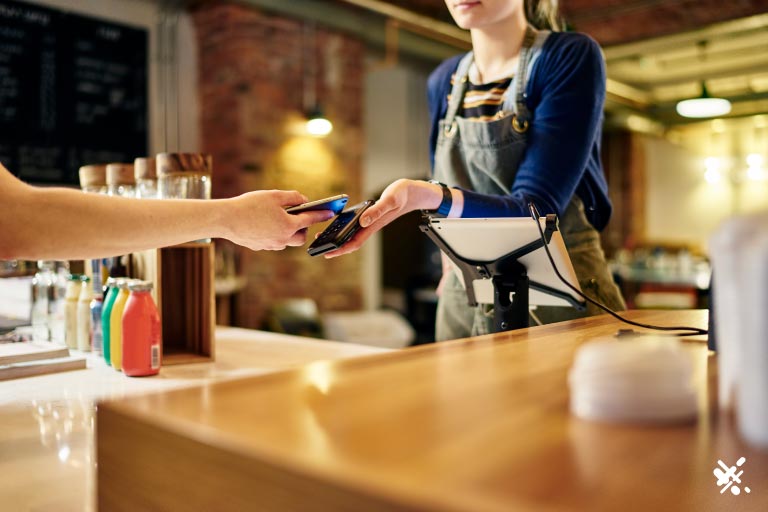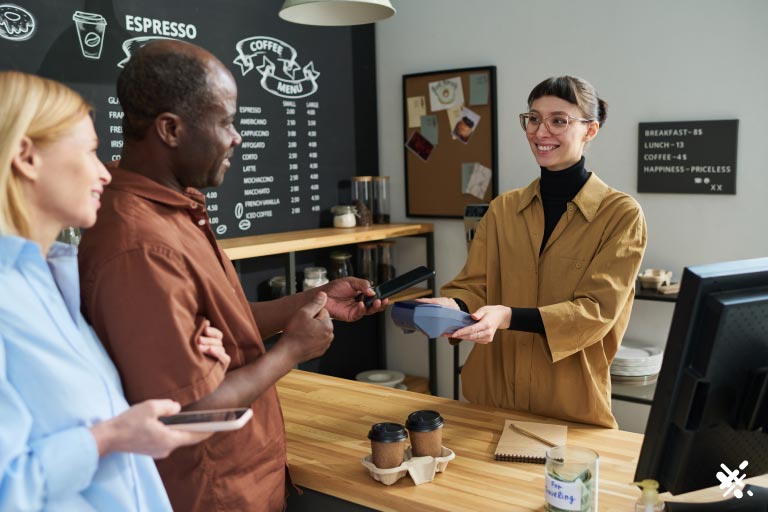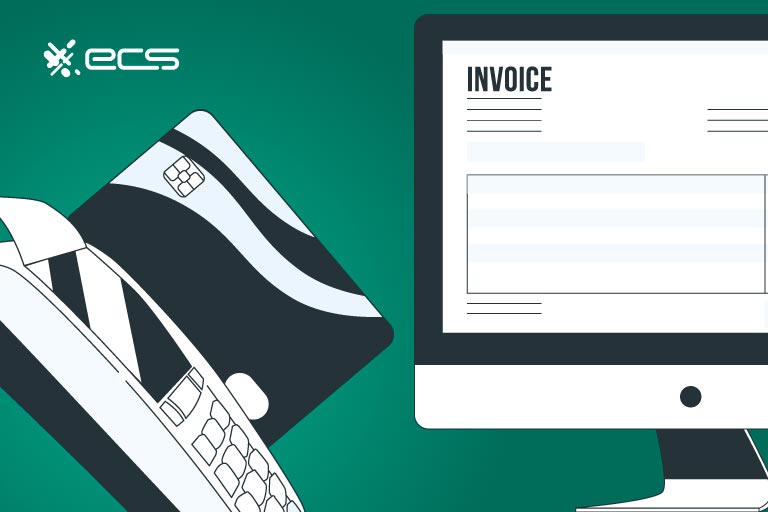Suppose you’ve recently opened a business or are planning to. In that case, you’ve no doubt also looked into electronic payment solutions so that you can accept credit and debit cards. But what’s the difference between a payment terminal vs. POS system? Which do you need?
At first, much of this information seems overwhelming for a new business owner who wants to accept customer credit card transactions. But it’s important to understand all the features available to you regarding payment processing.
There are a lot of operational and technological advantages that come with the right payment solutions. Businesses can often use them to save a significant amount of money. Not only that, but they can create efficiencies that make it easier to scale and manage your business from day one.
One area this is true is when it comes to the payment terminal or point of sale (POS) system you choose for your business. Payment terminals and POS systems are two separate ways of accepting credit cards, even though, on the surface, they may look very similar.
In this article, we’ll explain the differences between payment terminals and POS systems and help you decide which features are right for your business.

Payment Terminal Vs. POS System Basics
Payment terminals and POS systems are both credit card processing hardware types. There are also virtual terminals that allow businesses to run credit card transactions via the phone, but these are software-based terminals.
Payment terminals and POS (point of sale systems) are the physical hardware devices that a business will use to capture credit card data from customers through a swipe, tap, or dip.
POS, in this context, refers to “point of sale.” In the credit card processing industry, this refers to where the actual transaction or sale occurs for the customer. So generally, these are devices located at checkout areas, cash registers, or at the front counter of a business.
Some businesses have both an online and a retail component; for these businesses, the merchant can integrate a POS system, which would work for both. We will touch on this later in our discussion of POS system features.
What Is A POS System?
A POS system is a mixture of hardware and software that work together to not only accept customer payments but also to streamline business operations and provide added features.
POS systems that need added functionality are becoming increasingly popular in restaurants and other retail locations.
Below are some key features a POS system can provide beyond payment transactions.
Sales Analytics
A POS system can have software that tracks various sales analytics and purchasing metrics. Merchants can incorporate it into other business management software, such as their accounting software. In fact, 86% of restaurants use data from their POS system to analyze and design their discounts, loyalty programs, and marketing strategies.This combination offers a powerful way for business owners to gain insight into their sales and customer behavior.
Employee Tracking
With specific software, a POS system can have employees who use the station log in and out as they go on shift or use the terminal. Employee management capabilities also include timekeeping for employees, plus payroll systems. These management features can streamline business operations outside of just payment processing.
Inventory
POS systems can also track inventory. As items are purchased, the POS software can deduct these items from the inventory and alert employees when supplies are low. POS systems also offer barcode scanners and similar devices used for inventory management.
Managing Reward Programs
Many businesses, including small businesses, run loyalty rewards programs for their customers. It’s a great way to create repeat sales and increase lifetime value from customers. Managing these can be easy when the merchant integrates them into their POS system. Employees can sign up new members and offer customer support for members right from the POS terminal at the checkout area.
POS System Flexibility
The features listed above are just a few examples of what a POS system can do. Also, not all features need to be used by every business. Overall, a POS system is very flexible and modular, allowing businesses to build a solution that works best for them.
If you need assistance with choosing a POS system, contact ECS Payments. We offer the latest in POS system hardware and software. Our experts can help tailor a system that suits your business’s needs perfectly.

What Is A Payment Terminal?
Now that we’ve reviewed POS Systems, we’ll look at payment terminals in this section.
Payment terminals are more straightforward compared to POS systems. A payment terminal’s primary purpose is capturing customer card data. Several brands offer these, such as the popular Dejavoo Terminal.
Below are some of the common types of credit card terminals merchants use.
Mobile Reader
As the name suggests, these card readers can be used on the go or at a location when employees need to move about the store or showroom and collect payments. They capture card data and then transfer it for processing. Merchants can use them alone or when attached to a smartphone or tablet.
Card readers have no added features or functionality, although merchants can integrate them with larger payment systems. But by themselves, they are primarily for capturing card data when mobile.
Examples include pop-up stores or mobile businesses, such as mobile repair or pet grooming services.
Desktop or Countertop Readers
These are the traditional card readers most people may see at the checkout area of a small business. By themselves, these also capture card data and transmit it for authorization. Once authorized, the terminals receive a message that the transaction was successful.
Merchants can also integrate terminals and card readers like these into a complex POS system. However, they also can work alone if no other functionality is required. Although, this type of setup is becoming less popular as more and more businesses realize the added benefits of POS systems.

Types Of Payment Terminals And Readers
EMV Chips
These are the newest style of card readers. They work with the small chips you see in modern cards. EMV stands for Europay, Mastercard, and Visa. Those companies created the technology and standards for the card and chips.
EMV readers also can swipe the card through the older magnetic strip. However, processors are phasing this out, no longer allowing these types of transactions, depending on the situation. A POS system still uses the swipe function for reward cards or certain gift cards.
Contactless Payments
Contactless payment terminals accept payment methods such as Apple Pay, Android Pay, and similar services. These readers use NFC or near-field communication technology to receive payment data from digital wallets or contactless credit cards.
Generally, a terminal will have all of these. Although, you can still get terminals without some of these newer features like NFC capabilities. When buying or leasing new equipment, it’s best to get terminals with newer features even if you haven’t implemented them yet.
Card Readers Vs. POS Systems
While these seem like they do the same thing, there are essential differences between them, and they are two separate parts of a processing system. The card reader is a modular component of a more extensive POS system. It is needed to capture the card data.
But that card reader can also be a stand-alone terminal and doesn’t require a POS system attached to it. The terminal can process payments alone, although with limited other functions.
A POS system, on the other hand, needs a reader. The POS software can do a lot of different tasks, but it needs a reader to capture card data.

The Benefits Of A POS System
Below are some benefits of a POS system over a standard payment terminal. These can benefit virtually every business type and help streamline operations and reduce costs.
Improved Accuracy And Reduced Human Error
One key area of a POS System is that it safeguards against many mistakes employees may make during checkout. By being part of a secure software system, if an employee misses a step or does not enter specific data, the transaction will only continue once the employee fixes the situation.
An example of this is during the return process. An employee may need to learn the return procedure for a specific item and how the crediting works for that purchase. A POS system can alert them that the item is only eligible for full credit or return if certain conditions are met. With a payment terminal, an employee may complete the return transaction and credit the customer, costing the business money.
Know Who Processed Transactions
Since employees can log into a POS system with a unique user ID, this allows better tracking of which employees worked with specific customers or transactions. Suppose there are ever questions or there is clarification needed. In that case, it’s easy for management to see who handled the transaction or was working at the terminal.
This feature can also be good for security, as only authorized employees can operate the payment systems.
Increase Loyalty Reward Sign-ups
With a POS system, you can register new sign-ups to your loyalty reward program right at checkout with only a few additional steps. Without a POS system, you would have to direct customers to a website or other portal to sign up, which decreases the conversion rate and overall sign-up.
Employees can also manage the reward program at the POS system and look up points or other features when a customer asks.
Connect Different Locations
Suppose your business has different locations in the same city or country. In that case, a cloud-based POS system makes updating multi-locations more effortless. Because the control of the POS system is centralized, You can make updates, include more products, or remove from one location. The connected software then pushes out these changes to all your POS systems with an update.
A mix of payment terminals can often be a considerable headache to update, and staff must often travel to each location to make these updates.
Drawbacks Of POS System
At this point, POS systems may seem superior to terminals. That is mostly true, but they have a few drawbacks that can be managed and should still be considered.
Most importantly, POS systems have higher security requirements. Because they connect with various computers and networks, it makes them a central target for a hacker or a security breach.
A breach with one of your POS systems can be a more significant security concern due to the interconnectivity of the systems.
However, you can manage this with the proper security protocols and by following all PCI DSS requirements for your specific business and processing volumes.

Benefits Of Payment Terminals
Although POS systems are fantastic and offer many benefits, payment terminals also provide their own advantages.
Simplicity
Simplicity is the key benefit of a payment terminal. Terminals are fast to set up and maintain and often require no additional support once they are up and running. Making them a better fit for businesses with simple processing needs.
Can Be More Secure
Although fraud with payment terminals does exist, a payment terminal can be overall more secure than POS hardware and software with less effort. Primarily because a POS system integrates with a computer system. Providing an avenue for hackers and others to access the entire system.
Both systems can be secure. But it can often be easier to secure payment terminals for those without the resources of dedicated IT staff.
Less Expensive
Since terminals do less, it stands to reason they would be the less expensive option compared to POS systems. Payment terminals also require less setup and customization, which also saves money.
Overall, businesses will often enjoy lower initial costs when setting up a payment terminal compared to a POS system.

Deciding Between a Payment Terminal Vs. POS System
The choice between a payment terminal vs. a POS system comes down to two main factors regarding your business. Those are the current state of your business, and the other is how you want to grow your business in the future.
Growth?
Suppose you have simple processing needs and don’t plan for expansion or business improvements. In that case, a payment terminal can work well for you with the least initial cost and time invested.
However, suppose you want to leverage certain technologies and efficiencies to grow your business with improved workflows, sales analytics, and customer service improvements. In that case, a POS System is the right choice.
A POS system will generally have a higher initial cost. Still, it can pay for itself many times over with improvement to your business.
Specific Needs?
Another thing to consider is whether or not your business needs to solve a specific issue. In this case, looking into whether a POS system can address the problem for you and provide an easy solution is essential.
An example would be a small local restaurant chain that wants to implement a customer loyalty program that earns points with each visit. However, they may need to learn how to do this with their current simple payment terminal setup.
By upgrading to a POS system, they immediately open up the opportunity to implement a reward program into the most common restaurant POS systems.
A POS system may be a solution if your business is facing a specific issue or need.
Another example would be a liquor store chain that needs help keeping real-time inventory data, leading to wasted backroom space or a lack of products on shelves. POS systems offer real-time inventory data of purchased items. It is always keeping stock up to date. Not only that, analytics can be printed that show sales trends which can help the business purchase needed inventories ahead of time.
Learn More About POS Systems Vs. Payment Terminals
If you’re a business owner and want to learn more about POS systems and how they can benefit your business operations, contact ECS Payments.
ECS Payments is a leader in the payment processing industry, and we offer the latest POS systems to fit any business. Our experts can walk you through each system and find which solution provides the most benefits and cost savings.
Contact ECS Payments today and start leveraging the power of payment solutions to help grow your business for years to come.
